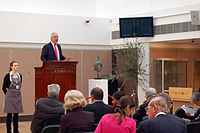
Photo from wikipedia
In a time of environmental crisis and ‘fake news’, there are calls for scientists to engage in public debate or advocacy. Some are wary, fearing that revealing subjective views poses… Click to show full abstract
In a time of environmental crisis and ‘fake news’, there are calls for scientists to engage in public debate or advocacy. Some are wary, fearing that revealing subjective views poses a risk to scientific credibility or erodes trust in scholarly publishing. Others are less concerned, seeing it as their duty to society or an opportunity to boost their profile. Ideally, we need better checks and balances that allow scientists to contribute to public discourse without fear of compromising the credibility of their science, while avoiding subjective views influencing the outcomes of peer-reviewed research. For better or worse, scientists have personal views. The question is not whether they should be condoned or condemned, but how they should be managed in the context of scholarly publishing to maximise benefits and minimise negative outcomes. Using the recent contention around global tree ‘restoration’ potential as an example, I propose we score journals and articles based on the Transparency and Openness Promotion (TOP) guidelines and associated criteria. A high TOP score means readers have sufficient access to information to assess the objectivity and credibility of scientific publications and their authors. I show that current practice provides very little access to information, and readers are essentially being asked to have faith in the scholarly publication system. We must do better.
Journal Title: South African Journal of Science
Year Published: 2020
Link to full text (if available)
Share on Social Media: Sign Up to like & get
recommendations!